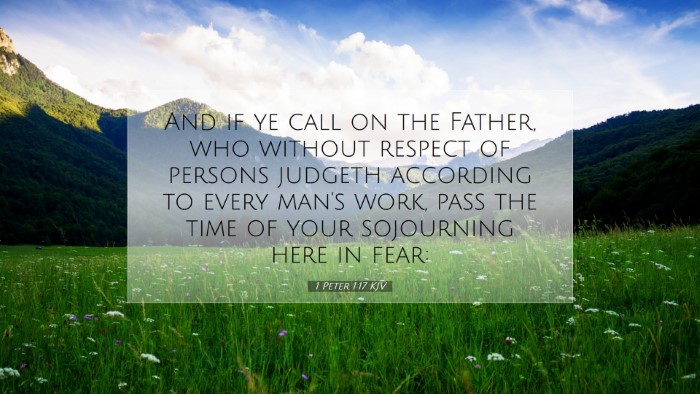Commentary on 1 Peter 1:17
Verse: "And if you call on Him as Father who judges impartially according to each one's deeds, conduct yourselves with fear throughout the time of your exile."
Overview
This verse captures the essence of a believer's relationship with God as Father, emphasizing God’s impartiality as a judge and urging a life of reverent conduct during our sojourn on Earth. As interpreters have noted, Peter emphasizes ethical living in light of divine accountability, bridging the realities of faith and daily life.
Key Themes
- The Fatherhood of God: The apostle presents God as a loving Father who presides over moral integrity and ethical behavior.
- Impartial Judgment: The emphasis on God’s impartiality underlines that all believers will face judgment based on their deeds regardless of their status.
- Exemplary Conduct: Believers are called to conduct themselves in fear, denoting a respectful acknowledgment of God’s holiness and justice.
Commentary Insights
The Fatherhood of God
Matthew Henry comments on the relational aspect of calling God "Father," noting that this relationship is foundational to understanding our duties. He emphasizes that our prayers and communion with God must be based on a realization of His authority and the gravity of His judgment, which fosters a humility in the believer.
Impartiality in Judgment
Albert Barnes elaborates on the concept of divine impartiality, stating that it signifies that God's judgment is not swayed by external factors such as ethnicity, social status, or past mistakes. He asserts that this reality should compel believers to reflect on their actions, knowing they are accountable to a God who sees all (Hebrews 4:13).
Conducting Oneself with Fear
Adam Clarke delves into the idea of "conducting yourselves with fear." He suggests that this fear must be understood as a reverent awe of God rather than simple dread. Fear in this context is a recognition of God’s holiness and power, inspiring believers to live in a manner worthy of their calling, especially as they navigate the challenges of their "exile" on Earth.
Theological Implications
- Ethical Living: The call to conduct oneself with fear implies a practical application of faith. It suggests a lifestyle marked by integrity, love, and moral uprightness.
- The Nature of God's Judgment: This verse plants the foundational understanding that God’s judgment is based on deeds, reinforcing the necessity of living out one’s faith through actions.
Practical Applications
In light of 1 Peter 1:17, pastors and theologians are encouraged to teach congregations about the importance of maintaining a proper relationship with God as Father while acknowledging His role as impartial judge. The following applications emerge:
- Teaching on Accountability: Regular discussions on accountability to God should be incorporated into sermons and Bible studies to cultivate a deeper understanding of ethical living.
- Encouragement for Righteous Living: Encourage believers to reflect on their deeds as a part of their faith journey, making sure to align their daily conduct with the teachings of scripture.
- Fostering a Culture of Reverence: Pastoral leadership should cultivate an atmosphere of reverence and awe towards God, emphasizing the beauty of His holiness alongside his grace.
Conclusion
The exhortation in 1 Peter 1:17 serves as a vital reminder for believers to live with an awareness of God's impending judgment while embracing their identity as children of God. By combining fear and love, believers are encouraged to navigate their spiritual exile with integrity, knowing they serve a God who judges impartially.


